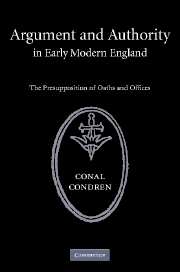Book contents
- Frontmatter
- Contents
- Preface
- Introduction
- Part I The liquid empire of office
- Part II The authority and insolence of office
- 7 The cases of patriot and counsellor
- 8 Casuistry as the mediation of office
- 9 The case of resistance to superior power
- 10 Metaphor and political autonomy
- Part III ‘I, A. B.’
- Epilogue
- Bibliography
- Index
10 - Metaphor and political autonomy
from Part II - The authority and insolence of office
Published online by Cambridge University Press: 28 October 2009
- Frontmatter
- Contents
- Preface
- Introduction
- Part I The liquid empire of office
- Part II The authority and insolence of office
- 7 The cases of patriot and counsellor
- 8 Casuistry as the mediation of office
- 9 The case of resistance to superior power
- 10 Metaphor and political autonomy
- Part III ‘I, A. B.’
- Epilogue
- Bibliography
- Index
Summary
He shews that People have a Right to private Truth from their Neighbours, and oeconomical Truth from their own Family; that they should not be abused by their Wives, Children and Servants; but, that they have no right at all to Political Truth.
(John Arbuthnot, The Art of Political Lying, 1712)From God and the sun to the mice in the fields; between them kings, constables, prison life and the protean philosopher. All were informed by the vocabulary of office, and so it is now necessary to confront the distinction between central and peripheral use, literal and figurative. There is, after all, a difference between the House of Lords and the house of office, between the sun calling the mice to their offices and anyone calling Charles I an ‘officer’. Yet such differences need handling with care; the grounds for making them are not unproblematic. The terrain covered here is at times difficult but the journey across it is important for understanding the argument and its implications for the study of history and politics.
A metaphorical use involves carrying a locution from one established field of discourse to another, hence the original Greek, metaphora, a carrying across, from meta + phorein (to convey messages), and hence the Latin translatio. Consequently, any understanding of the metaphorical is dependent upon awareness of a prior conceptual demarcation of experience. Metaphor is thus a creature of the specificity and adequacy of classification.
- Type
- Chapter
- Information
- Argument and Authority in Early Modern EnglandThe Presupposition of Oaths and Offices, pp. 209 - 230Publisher: Cambridge University PressPrint publication year: 2006

